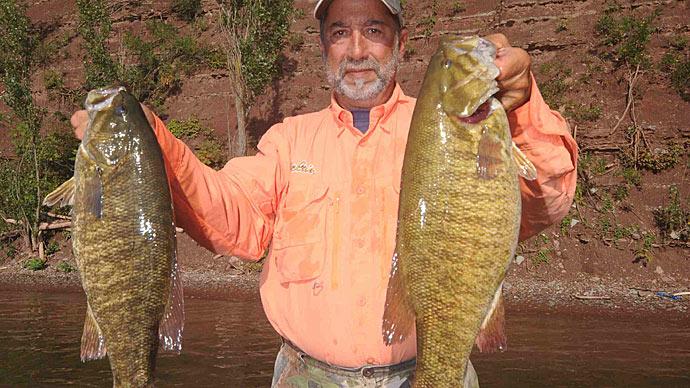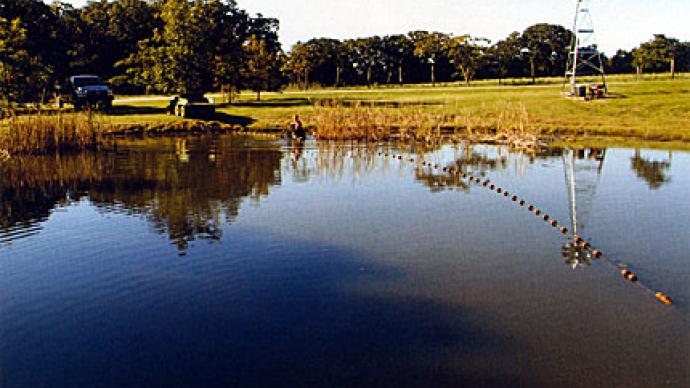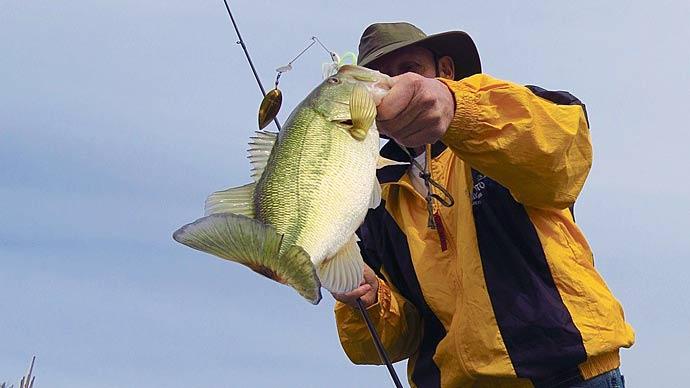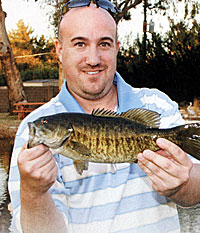
Everything in life has limiting factors. Our bodies do ... or we would live longer than Moses did. Our cars do... or we wouldn't need a mechanic. Fish do, or world records would be broken way too often. Our ponds do, too. But, if you think about your mini-pond more deeply, so to speak, you can manage those weak-link limiting factors.
Here's what I mean.
The seasoned, grizzled veterans of pond management will be first to tell you those limiting factors. What they, or we, won't tell you is how to figure out ways to defeat them. We haven't thought about it.
Almost every agency stocking handbook, even the American Fisheries Society stocking guides, will tell you not to stock largemouth bass in waters less than an acre. Not enough space to grow enough food fish to support more than a handful of bass. They tell you not to over-stock catfish because of their tendencies to outgrow their environment and cause water quality issues.
As a pondmeister, part of the fun for you is to figure out what your mini-pond will let you and what it will make you pay for.
I've seen some phenomenal things done with mini-ponds over the years.
The first case to strike my beady little biologist brain is what Aaron Matos did near downtown Phoenix, Arizona. That's right, in the desert, in the city where water is a commodity rather than a resource.
Aaron read all the stuff, packed his brain with all the logical information he could find. He tapped into www.pondboss.com on the discussion forum, went to pond meetings and interviewed experts and knowledgeable people. He came to several very cool conclusions.
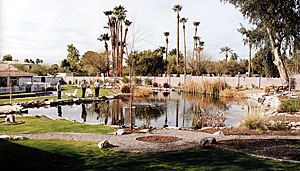
I, for one, explained to him that 90% of the fish will typically live in 10% of the pond. Everyone of you have heard me say that. Others explained to him that a pond can only produce finite amount of biomass before the water quality deteriorates to the point that living things die. Still others told him that fish such as smallmouth bass need cool water and good habitat.
He understood it ... very well.
So, he used all those theories 180 degrees away from those of us who taught him so well. He told me that he decided to do away with the 90% of a pond that fish won't use. Hmmm 100% of his mini-pond would be functional habitat. From the other's advice, Aaron decided he would cleanse his water based on its ability to get dirty... totally different than the "inside the box" thinking most of us have. Then, he decided to build the perfect habitat for several species of fish and watch how well they could do.
Oh, yes, he fed them. He even challenged feed companies to come up with a feed that almost 100% convertible to fish flesh.
Here's what he did.
He built a 1/10 acre pond in his backyard. Layered the bottom, like long, circa meandering stair steps. Then, he lined the entire pond bottom with round river rock in a variety of sizes and configurations. Then, he set up a pumping system and built an artificial wetland above the pond, where water would be sucked from the pond bottom and free flow through a maze of plants and soils and insects before cascading back into the pond at the other end.
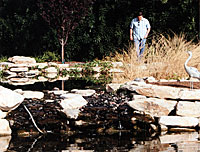
The rocks in the pond serve as giant substrates for colonies of bacteria which break down the dissolved nitrogen gasses that could harm his fish. That's where his water processing starts. The wetland, every bit of 40 feet long, gleans the excess nutrients from his water as it passes through an ever enriched plant community.
Every inch of the pond is habitat, so something thrives in it.
Not only did his smallmouth bass thrive in the desert heat for several years, they reproduced with largemouth bass to grow a handful of "mean-mouth" bass.
On any given day, Matos could walk out the back door, cast about 20 times and catch 15 fish. He's figured out what works.
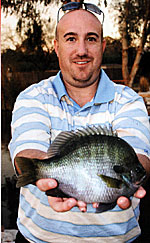
He decided to harvest his fish and re-route the entire program with a focus on growing fish. He bribed Bruce Condello to come from Nebraska to help harvest his mini-pond one weekend. Offered him plane fare, some free food and concert tickets (never mind the concert was Brittney Spears ... the two boys went anyway... reeking of pond mud).
The two rabid pond fanatics harvested and counted fish for two days. Removed and redistributed more than 750 pounds of bluegill and bass and kept 150 pounds of the prime fish for accelerated growth.
What Matos has figured out with his mini-pond is how to push it past 9,000 pounds of fish per acre by overcoming the limiting factors.
His system is high energy, but so is Aaron Matos.
The fisheries biologist in me is convinced he did the right thing, harvesting those fish. If not, his pond would have invented a brand new limiting factor at some huge level above "normal" and he would have a different ending than the one he chose.
Keyword here? Chose.
Simple ... think about what limits your pond. Is it the water? Is it habitat? Once you figure out what it is, do something about it. We're coming into the best time year to harvest the bounty of your small water and give it an about-face.
Don't be satisfied with your status. Think and re-think. Refine your goals a decide what you can do.
Personally, I have a mini-pond that I haven’t done a thing with except hold a few fish. I decided to follow Matos' lead. I'm gonna dig that .08 acre sucker about four feet and rebuild the habitat. Queen Debbie has been pestering me to get rid of a big pile of limestone that varies from the size of basketballs to grapefruits. She’s been on me for months to do something with it. I've scratched my head how to thoughtfully it to use. We'll take this little reservoir turn and it into a smallmouth pond, here in balmy North Texas. I'll take pictures and write it next issue.
What will you do?
Tell me ... and send pictures.
Reprinted with permission from Pond Boss Magazine

